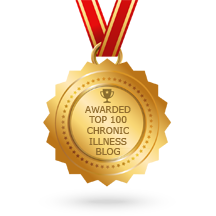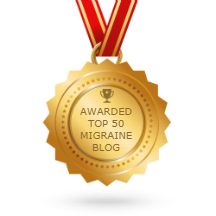The Struggles of Writing an Undergraduate Thesis with a Chronic Illness
Yesterday, I tweeted about how writing a thesis with chronic migraine has been one of the most difficult things that I've done. It got an outpouring of love and it just so happened to be on a day that I finished the first draft of my body chapters. I was already feeling good, and I'm a month out from my final deadline. But it hasn't been like this for the whole process. I feel like I don't read enough about young adults with chronic illness going through school/university, so I thought that I'd spend a bit of time writing down my own experiences over the past year.
My thesis process started a year ago when I applied for a grant to do my research. I'm writing about the development of pain management as a medical specialty, and how the physician organizations that were created within the specialty became advocacy groups that influenced public policy in the 1990s and 2000s. It's a deeply personal project for me, as the first doctor who took me seriously was a pain management specialist. In essence, this is a look at how the pain problem (including the rise of the opioid crisis) came to be in the United States.
There's been a lot of emotions that have gone into this project. Writing a thesis is not an easy process, even for anyone who is able-bodied. Throw in a debilitating chronic illness and anxiety, and it makes a hard process even harder.
One of the main issues that I keep running into is completing the deadlines that I set for myself. This is applicable to anything outside of a thesis, either in work or in school, but I've been feeling it particularly often with this. I'll say that I'll want to write 10 pages by the end of the week, but then get hit with pain at some point and have to make up my classwork or completely lose a couple days. Then I would get upset with myself that I couldn't hit that deadline, which was self-imposed, and if I couldn't even finish that, how could I complete my thesis?
It's thinking like this that would lead me to feel like I was failing, that everyone around me was hitting their deadlines and was on track, but somehow I wasn't capable of doing this project. Which, quite frankly, is bullshit.
Just because I have down days, which I will always have, does not mean that I am not capable of doing what I put my mind to. Like everything else I've done in college, I just needed to do it at my own pace. So what does that look like? It means that I need to set realistic goals for myself, taking into account that I will have great days where I do everything that I set out to do and more, and I'll have bad days, where the best that I can do is get up and get out of bed. If I defined myself by my down days, I would feel defeated and incapable, which I did for a while. There have been so many days that I've sobbed on the phone to my parents, crying about how I'm behind and why am I even doing this if my brain won't work?
The reality is that my thesis is as much about my mentality and belief in myself as it is about the writing and the work that goes into it. I need to be kind to myself and understand what I need to work well when I am feeling okay to do so. I can't force myself to work with extreme pain. When my brain isn't working, it doesn't help to get upset at myself. I can only do what my body allows me to, so it's better to take the time to rest and recover than it is to push myself and put out mediocre work, or even worse, gibberish. Just because I am disabled does not mean that I cannot do this. I am passionate about my work, and through this whole process, I've come to know SO much about this topic. I mean, if you ask me a question, I promise you that I will spend hours answering it and discussing the evidence with you. My inability to work on some days is NOT connected to my passion or my ability to finish the project in the long run. It's just another fact of my life. I am a young, disabled academic. I can't work in the same way that my able-bodied friends can. And that's okay.
A main theme of my thesis is legitimacy. Whose pain was considered real? Whose pain deserved to be treated? As we all know, this is still an issue that many people with chronic illness and chronic pain deal with today. In a way, writing about these different theories has made me think about my own medical traumas where my pain has been ignored or dismissed. It's been difficult to work through my own history with chronic pain as I write about the ways that chronic pain has been understood historically. For a long time, pain was seen as either somatic or psychogenic (body or mind), and was theorized that it was impossible to be both. Now, there's the widespread idea that chronic pain is connected to both the mind and the body, not one or the other. But I've met people and doctors who have tried to convince me that my pain was a result of stress and anxiety, that it was somehow me that was creating my chronic health problems. On the other side of that is illness-splaining, where people think they know what treatments will work for me without bothering to ask what I've tried. One funny letter from the 1970s I came across in the archive I researched at recommended fire walking as a modality for chronic pain relief. Fire walking. As in walking across hot coals, barefoot. To relieve pain. Yeah, these type of "recommendations" for pain have been going on for a very long time.
At the end of the day, we are the ones who know the most about ourselves and what we need to succeed. Whether the task is completing an assignment, cleaning our rooms, or writing a senior thesis (or master's or Ph.D dissertation), we are the only people who know what we are feeling in our bodies and how to plan to succeed in our goals. The biggest part of what I've learned throughout this whole process is that I need to take it a day at a time. Every day provides a new opportunity for me, either to learn to treat myself more kindly if I'm in pain or to write about a topic that I love, even if I don't do as much as I want to. Anything that I do is good enough. Whether I write one sentence or five pages, whatever I am able to produce is something to celebrate. I've started telling myself that every day, and even though it doesn't seem like a lot, that extra bit of confidence helps me a lot.
On April 16th, I'm going to hand in my thesis. It may not be perfect, but I'm going to be proud of it no matter what. Because anything that I do and complete is something to celebrate. Repeat after me: I am capable. I am disabled. And I can do this.
P.S. I'm partnering with the Migraine World Summit to promote this great informational (free) online event happening between March 20-28, 2019.
Join more than 100,000 new and returning attendees and tune in to 32 NEW interviews to find the answers to help better manage migraine and chronic headache. Questions answered include:
- What new treatments are available or coming soon?
- What can I learn from successful patient case studies?
- What new non-medicinal alternatives are recently available?
- How can I break refractory chronic migraine?
- When should I get a scan for my headache condition?
- How are neck pain and migraine related?
- How important are sleep and exercise really for those with migraine?
- Are supplements or vitamins worth considering?
- What are some common drug interactions and side effects we should know about?
- What do I need to know about hemiplegic and vestibular migraine?
- How important is diet for migraine and headache?
- How can I interpret migraine research?
The World Summit brings together leading experts and is an excellent way to learn more about current migraine research related to living and treating migraine. I'm going to be tuning in too!
Claim your FREE ticket now at the following link:






51 comments: